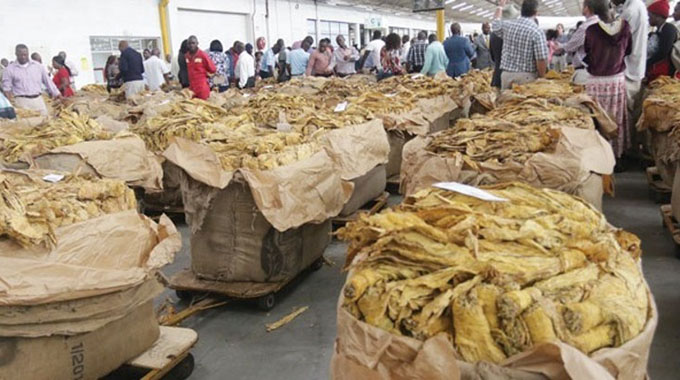
Kudakwashe Ruzive
FARMERS delivering their harvest from last season’s bumper summer crop are reaping rich pickings at the markets, with grain and tobacco growers having already pocketed nearly $30 billion in earnings over the first eight weeks of the marketing season.
Latest data obtained from the Grain Marketing Board (GMB) shows that the grain utility had paid farmers nearly $3 billion as at Thursday last week.
Tobacco farmers, on the other hand, had sold crop worth over US$301 million (nearly $25 billion at the official exchange rate) by end of last week.
To date, 71 518 tonnes of maize have been delivered to the GMB, up from the 21 894 tonnes that had been delivered over the same period last year.
Farmers have also delivered 4 295 tonnes of traditional grains up from 231 tonnes last year, while 5 844 tonnes of soyabean have been sold, an increase from the 689 tonnes that had been sold at the same time last year.
Farmers contracted under the CBZ Agro-Yield Scheme (Command Agriculture), who have access to mechanical driers, have led the deliveries.
An efficient payment system at the GMB has also encouraged rapid deliveries. This year’s grain marketing season commenced on April 1, while tobacco auction floors opened on April 7.
GMB is paying $32 000 for a tonne of maize, $48 000 for a tonne of soya bean and $38 000 for traditional grains.
The price of tobacco at auction floors is avaraging at over US$2,60/kg.
Government has set aside $60 billion to ensure timely payment of farmers, with the GMB effecting payments to farmers within 72 hours of delivery.
GMB chief executive Mr Rockie Mutenha said: “Over $2, 730 000 000 has been paid for grains as at 26 May 2021.”
Praise for new system
Zimbabwe Farmers Union director Mr Paul Zakariya said GMB’s payment system had improved immensely from previous years.
“There is great improvement in payment turnaround time,” said Mr Zakariya.
“The payment system was decentralised and payments are effected within 72 hours after delivery. We have had some complaints to do with delayed payments but these are not as bad as in other past seasons.
“We continue to monitor the situation as delivery volumes pick up.”
He said in future GMB should consider introducing a system where farmers are paid upon delivery.
“In terms of payment modalities we hope that in the near future, farmers can get payment upon delivery.
“This will bring some efficiency at farmer level as grain delivery can be combined with inputs purchase.
“Although the economy is showing stability, increases in prices of utilities like fuel is pushing costs of production.
“More so, the parallel market rate is tracked for determining prices on the open market,” said Mr Zakariya.
He said the pre-planting price was under pressure from the increasing costs and threatening grower viability.
Zimbabwe Commercial Farmers Union president Dr Shadreck Makombe said: “All farmers who delivered their grain to GMB have been paid so far.
“There have been no complaints about the payments as well. There is also transparency and no side marketing has been allowed.”
Tobacco
Statistics from the Tobacco Industry and Marketing Board show that 112 001 557 kgs of the golden leaf had gone under the hammer at an average price of US$2.69/kg by last week.
In recent weeks, farmers had raised concern over delays in the processing of their payments but the problem has since been rectified following an intervention by TIMB and the Reserve Bank of Zimbabwe.
TIMB Public Relations Officer Ms Chelesani Moyo said the delays were caused by challenges arising from a new Information Communication Technology system deployed by some auction floors this year.
“Soon after the opening of the 2021 tobacco marketing season, some contracting companies faced IT system challenges because of many decentralised selling points,” she said.
“The challenges affected processing of payments to farmers. That issue was discussed with the affected contracting companies and it was agreed that they revert to their old IT systems to ensure timeous payments to tobacco growers.
“In the event of any IT system challenges, companies have been asked to communicate timeously with the growers so that they make their own decisions.”
Ms Moyo said delays in payments were also initially caused by sluggish processing of inter-bank money transfers by the national payment clearance system.
“This has since improved after the intervention of The Reserve Bank of Zimbabwe. As TIMB we always ensure that all stakeholders involved in the marketing of tobacco do so in an orderly manner hence continuous monitoring of the tobacco marketing process.”
About 200 million kgs of tobacco will be sold this season, as compared to 180 million kgs that were sold last year.
ENDS_
